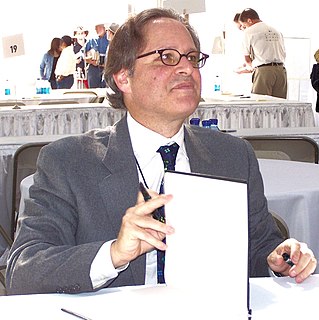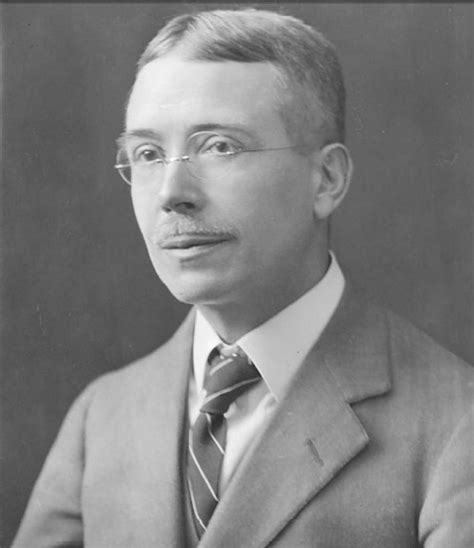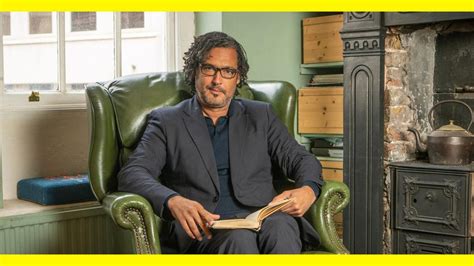Top 1200 English Teacher Quotes & Sayings - Page 17
Explore popular English Teacher quotes.
Last updated on November 17, 2024.
English character and English freedom depend comparatively little on the form which the Constitution assumes at Westminster. A centralised democracy may be as tyrannical as an absolute monarch; and if the vigour of the nation is to continue unimpaired, each individual, each family, each district, must preserve as far as possible its independence, its self-completeness, its powers and its privilege to manage its own affairs and think its own thoughts.
I had the advantage, that I know Swedish. So I had the Swedish book and I had a lot of English translations, and German translations, and I did everything to make the best English translation of August Strindberg's Miss Julie I could. And then, there I went. "Oh! I think she's thinking this, but I think she should say it!" And so on. It's wonderful to do that.
I was bought an electric guitar when I was 12, but my guitar teacher beat me up. I didn't like guitar lessons... My teacher was obviously bored giving me lessons, and one day I offered him a liquorice toffee, but he didn't answer. So I threw it at him, it hit him in the face, and he sort of beat me up.
My music teacher was like, "Ester, you need to pay attention in class." I'm like, "No miss lady, 'cause I can sing." I didn't want anybody to change the way I sung. I learned by gospel CDs and by watching my momma sing; I didn't need this teacher to tell me. I wish I had, because then I would have learned how to play the damn piano or something. I would have a couple of more things under my belt if I wasn't so hard-headed.
The embrace of present and past time, in which English antiquarianism becomes a form of alchemy, engenders a strange timelessness. It is as if the little bird which flew through the Anglo-Saxon banqueting hall, in Bede's Historia Ecclesiastica Gentis Anglorum, gained the outer air and became the lark ascending in Vaughan Williams's orchestral setting. The unbroken chain is that of English music itself.
I can hardly believe that I even know this, but I am aware that Noah Webster's original dictionary, apart from being the first truly American lexicography, was a kind of line in the sand. It claimed a very discrete, American form of the English language, explicitly to compare it to the English of our erstwhile colonial masters who had been operating under Dr. Johnson's dictionary rules for well over a century.
I remember reading 'The Grapes of Wrath' in high school in 1983. My family had immigrated to the U.S. three years before, and I had spent the better part of the first two years learning English. John Steinbeck's book was the first book I read in English where I had an 'Aha!' moment, namely in the famed turtle chapter.
I was bought an electric guitar when I was 12, but my guitar teacher beat me up. I didn't like guitar lessons and I got quite bored. My teacher was obviously bored giving me lessons, and one day I offered him a liquorice toffee, but he didn't answer. So I threw it at him, it hit him in the face, and he sort of beat me up.
Joyce's writing in Dubliners contains some of the most unshowily beautiful sentences in the English language. I learned from him that if you write a good, clean line of English, you can get under a reader's skin. The reader won't even know why, but there you are. Didion, Berger, the many others I mentioned above, and many, many poets I haven't mentioned. Writers of this calibre are the moving targets the rest of us are always chasing.
Being someone who had had a very difficult childhood, a very difficult adolescence - it had to do with not quite poverty, but close. It had to do with being brought up in a family where no one spoke English, no one could read or write English. It had to do with death and disease and lots of other things. I was a little prone to depression.
To write or even speak English is not a science but an art. There are no reliable words. Whoever writes English is involved in a struggle that never lets up even for a sentence. He is struggling against vagueness, against obscurity, against the lure of the decorative adjective, against the encroachment of Latin and Greek, and, above all, against the worn-out phrases and dead metaphors with which the language is cluttered up.
English is, from my point of view as an Americanist, an ethnicity. And English literature should be studied in Comparative Literature. And American literature should be a discipline, certainly growing from England and France, Germany, Spain, Denmark, and the Native traditions, particularly because those helped form the American canon. Those are our backgrounds. And then we'd be doing it the way it ought to be done. And someday I hope that it will be.
I got sent off to my grandmother's for five months and watched a lot of TV and had a lot of grilled cheese with butter on it - because she was English and put lots of butter on everything - and yogurt. The English are big on dairy products, you know? I'd have an earache, and she'd be like, "Here, have some milk." Wonderful woman, but she had kind of screwed-up nutrition ideas.
An important United Nations environmental conference went past 6:00 in the evening when the interpreters' contracted working conditions said they could leave. They left, abandoning the delegates unable to talk to each other in their native languages. The French head of the committee, who had insisted on speaking only in French throughout the week suddenly demonstrated the ability to speak excellent English with English-speaking delegates.
For most of us the rules of English grammar are at best a dimly remembered thing. But even for those who make the rules, grammatical correctitude sometimes proves easier to urge than to achieve. Among the errors cited in this book are a number committed by some of the leading authorities of this century. If men such as Fowler and Bernstein and Quirk and Howard cannot always get their English right, is it reasonable to expect the rest of us to?
Knowledge passes from dance teacher into the student through the process of mane, which is often translated as imitation, but learning to dance is more a process of total identification than of simple copying. We repeat the movements of our teachers until we can duplicate them exactly, until, in a sense, we have absorbed the teacher's mastery into ourselves. Artistic technique must be fully integrated into the cells of our bodies if we are to use it to express what is in our hearts, and this takes many years of practice.
When I turned 11, we had to leave East Germany overnight because of the political orientation of my father. Now I was going to school in West Germany, which was American-occupied at that time. There in school, all children were required to learn English and not Russian. To learn Russian had been difficult, but English was impossible for me.
Every human being needs to know to be a great parent, for a teacher to be a great teacher, and for a business partner to be a great business partner. We can't fall back on, "Oh, I only said it once and it didn't matter." That kind of phrase. That's a not-good thing for a leader to hold inside. If what that leader did is do that separation and this person now knew that they were not going to be on the popular team, doing it once and then not doing it again isn't enough to erase what just happened.
From the Latin word "imponere", base of the obsolete English "impone" and translated as "impress" in modern English, Nordic hackers have coined the terms "imponator" (a device that does nothing but impress bystanders, referred to as the "imponator effect") and "imponade" (that "goo" that fills you as you get impressed with something - from "marmelade", often referred as "full of imponade", always ironic).
I acknowledge Mike Leigh and Ken Loach. They are prostlytizers of English socialism preaching to the converted and telling us what we already know. Cinema is best served away from documentary neo-realism. I come from a tradition of post-post-Italian neo-realism in England, where we've produced the best television in the world. But to paraphrase Truffaut, the English have no visual imagination.
You will hear people say the C-word. Except, it's a regional language: in British English, c - t has much less of an inflammatory sense than it does in North American English. You can hear someone on British TV called "a c - ting monkey" or a man being called a c - t. The particular fascination of profanity is how culturally specific it is and how it evolves.
In the current environment, attributing low student performance to teacher tenure is one of the great unproven causal links out there. The relationship just hasn't been examined very carefully, but we should all recognize that in higher education the strongest institutions generally have the most robust tenure systems, and in elementary and secondary, the states with the strongest teacher unions (and tenure systems) tend to have the highest student performance.
A real Master is not a teacher: a real Master is an awakener. His function is totally different from a teacher; his function is far more difficult. And only very few people can stay with a Master because to wake up after millions of lives is not an ordinary feat; it is a miracle. And to allow somebody to wake you up needs great trust, great surrender.
I don't believe in school prayer. I think it's total nonsense...who is the teacher there that is going to have them pray? And is the teacher going to be Catholic or Mormon or Episcopalian or what? It just causes all sorts of problems. And what are the kids praying about anyway? Does it really matter, does praying in school...what are you doing it for? The whole thing just opens up all sorts of elements of discussion. I think it's crazy.
I've played English a number of times, and used an English accent a number of times, so it becomes a little bit of an obstacle course to go, "Oh, that's teetering into Captain Jack-ville," or "This is teetering into Chocolat or Wonka." You've got to really pay attention to the places you've been. But, that's part of it. That's the great challenge. You may get it wrong. There's a very good possibility that you can fall flat on your face, but that's a healthy thing for an actor.
By being so long in the lowest form [at Harrow] I gained an immense advantage over the cleverer boys. . . . I got into my bones the essential structure of the ordinary British sentence - which is a noble thing. Naturally I am biased in favor of boys learning English; I would make them all learn English: and then I would let the clever ones learn Latin as an honor, and Greek as a treat.
Trevor realized that the odd thing about English is that no matter how much you screw sequences word up up, you understood, still, like Yoda, will be. Other languages don't work that way. French? Dieu! Misplace a single le or la and an idea vaporizes into a sonic puff. English is flexible: you can jam it into a Cuisinart for an hour, remove it, and meaning will still emerge.
I think evolution should be taught as an accepted principle. I say that also as the daughter of a school teacher, a science teacher, who has instilled in me a respect for science. I think it should be taught in our schools. I won't ever deny that I see the hand of God in this beautiful creation that is earth. But - that is not a part of state policy or a local curriculum in a school district. Science should be taught in science class.
I found cause to wonder upon what ground the English accuse Americans of corrupting the language by introducing slang words. I think I heard more and more different kinds of slang during my few weeks' stay in London than in my whole "tenderloin" life in New York. But I suppose the English feel that the language is theirs, and that they may do with it as they please without at the same time allowing that privilege to others.
It may be a mere patriotic bias, though I do not think so, but it seems to me that the English aristocracy is not only the type, but is the crown and flower of all actual aristocracies; it has all the oligarchical virtues as well as all the defects. It is casual, it is kind, it is courageous in obvious matters; but it has one great merit that overlaps even these. The great and very obvious merit of the English aristocracy is that nobody could possibly take it seriously.
We had probably our best ever Player of the Year Dance last week. You elected Dennis Wise as Player of the Year. Dennis accepted his award mimicking Vialli, whereupon Zola shouted 'Speak English', Dennis switched to his normal Cockney voice only for Zola to shout 'You're still not speaking English'.
I remember I was very taken with a book called DreamTigers by [Jorge Luis] Borges. He was at the University of Texas, Austin, and they collected some of his writings and put them in a little collection. It's called DreamTigers in English, but it doesn't exist in Spanish. It's a little sampler. But that collection in English is what struck me, because in there he has his poems, and I was a poet as well as a fiction writer.
This book is intended for use in English courses in which the practice of composition is combined with the study of literature. It aims to give in a brief space the principal requirements of plain English style. It aims to lighten the task of instructor and student by concentrating attention (in Chapters II and III) on a few essentials, the rules of usage and principles of composition most commonly violated. The numbers of the sections may be used as references in correcting manuscript.
I don't think it is always necessary to take up the anti-colonial -- or is it post-colonial? -- cudgels against English. What seems to me to be happening is that those people who were once colonized by the language are now rapidly remaking it, domesticating it, becoming more and more relaxed about the way they use it -- assisted by the English language's enormous flexibility and size, they are carving out large territories for themselves within its frontiers.
The teacher would say, 'Not everybody makes it as a footballer, so what do you want to be?' I'd say, 'A footballer.' The teacher would say, 'But not everybody makes it. So what do you want to be?' I'd say, 'A footballer.' Every year that happened! Nothing was going to get in the way of me being a footballer.
Shakespearean words, foreign words, slang and dialect and made-up phrases from kids on the street corner: English has room for them all. And writers - not just literary writers, but popular writers as well - breathe air into English and keep it lively by making it their own, not by adhering to some style manual that gets handed out to college Freshmen in a composition class.
I was a trial lawyer. At the same time, I was a teacher. I taught about the political and social content of film for American University. Then I left and became a teacher at the University of California at Santa Cruz. I taught about the political and social content of film, but I also taught a course in law for undergraduates.
Read a lot. But read as a writer, to see how other writers are doing it. And make your knowledge of literature in English as deep and broad as you can. In workshops, writers are often told to read what is being written now, but if that is all you read, you are limiting yourself. You need to get a good overall sense of English literary history, so you can write out of that knowledge.
I want to say unequivocally that while I cherish every person who comes from anywhere, who comes here legally and seeks to pursue happiness, and I hope all of them decide to stay and become American citizens, but I want them to become American. And part of becoming American involved English. It is vital historically to assert and establish that English is the common language at the heart of our civilization.
One of the producers, Wonjo, was an amazing interpreter. I don't think we really knew how it was going to work at the beginning. Yet it was something that a couple of days into it seemed so seamless and it wasn't something that we noticed or thought about. A couple of times I cornered him and forced him to speak English but we didn't speak much English at all. That said, I don't think anything was ever lost in translation. It was all very easy.
If one takes pleasure in calling the gold standard a "barbarous relic," one cannot object to the application of the same term to every historically determined institution. Then the fact that the British speak English - and not Danish, German, or French - is a barbarous relic too, and every Briton who opposes the substitution of Esperanto for English is no less dogmatic and orthodox than those who do not wax rapturous about the plans for a managed currency.
The Saga of Dharmapuri is one of the great works of modern Indian literature. (...) Set against Vijayan's heroic and scatological Candide -- originally written in Malayalam and finely translated into English by the author -- the timidity of our own English talent for political satire is embarrassingly laid bare. For this is dangerous stuff, and cut close to the bone. (...) Fiercest of all is Vijayan's Voltairean recoil from Indian cringing to power.
English Bohemianism is a curiously unluscious fruit. ... Inside this hothouse, huge lascivious orchids slide sensuously up the sweating windows, passion-flowers cross-pollinate in wild heliotrope abandon, lotuses writhe with poppies in the sweet warm beds, kumquats ripen, open and plop flatly to the floor-and outside, in a neat, trimly-hoed kitchen-garden, English bohemians sit in cold orderly rows, like carrots.
There is one thing about Englishmen, they won't fix anything till it's just about totally ruined. You couldn't get the English to fix anything at the start. No! They like to sit and watch it grow worse. Then, when it just looks like the whole thing has gone up Salt Creek, why, the English jump in and rescue it.
Listen, boy, just ask the chef to make me a proper Full English Breakfast. You know, bacon, fried eggs, sausages, liver, grilled mushrooms and tomatoes, black pudding, kidneys, baked beans, fried bread, toast and served with strong English mustard, mind - none of this effete French muck - and a large mug of hot, strong Indian tea.
I think that if you are sticking to the text, essentially, you're not trying to write your own version of it. I mean, of course, it is your own version of it. And every translator would probably have a different version. But I think that that's what keeps the writers from being individual in English. They may be my English, but I don't think that Ferrante sounds like Levi.
One should not as a rule reveal one's secrets, since one does not know if and when one may need them again. The essential English leadership secret does not depend on particular intelligence. Rather, it depends on a remarkably stupid thick-headedness. The English follow the principle that when one lies, one should lie big, and stick to it. They keep up their lies, even at the risk of looking ridiculous.
I had the best teacher in the business. Kevin Costner was my teacher. I was acting opposite him and he was directing me. The way he directed me, for which I am eternally grateful, is he would watch the scene back on the monitor, which is sort of considered unfashionable - you're not meant to watch yourself. But he was like, "Come around. Watch this. See there, you're doing a great reaction, but you're doing it out of frame." That was exactly what I needed. I learned how to act on film from him.
Climate helps to shape the character of peoples, certainly no people more than the English. The uncertainty of their climate has helped to make the English, a long-suffering, phlegmatic, patient people rather insensitive to surprise, stoical against storms,. slightly incredulous at every appearance of the sun, touched by the lyrical gratitude of someone who expects nothing and suddenly receives more than he dreamed.


























































